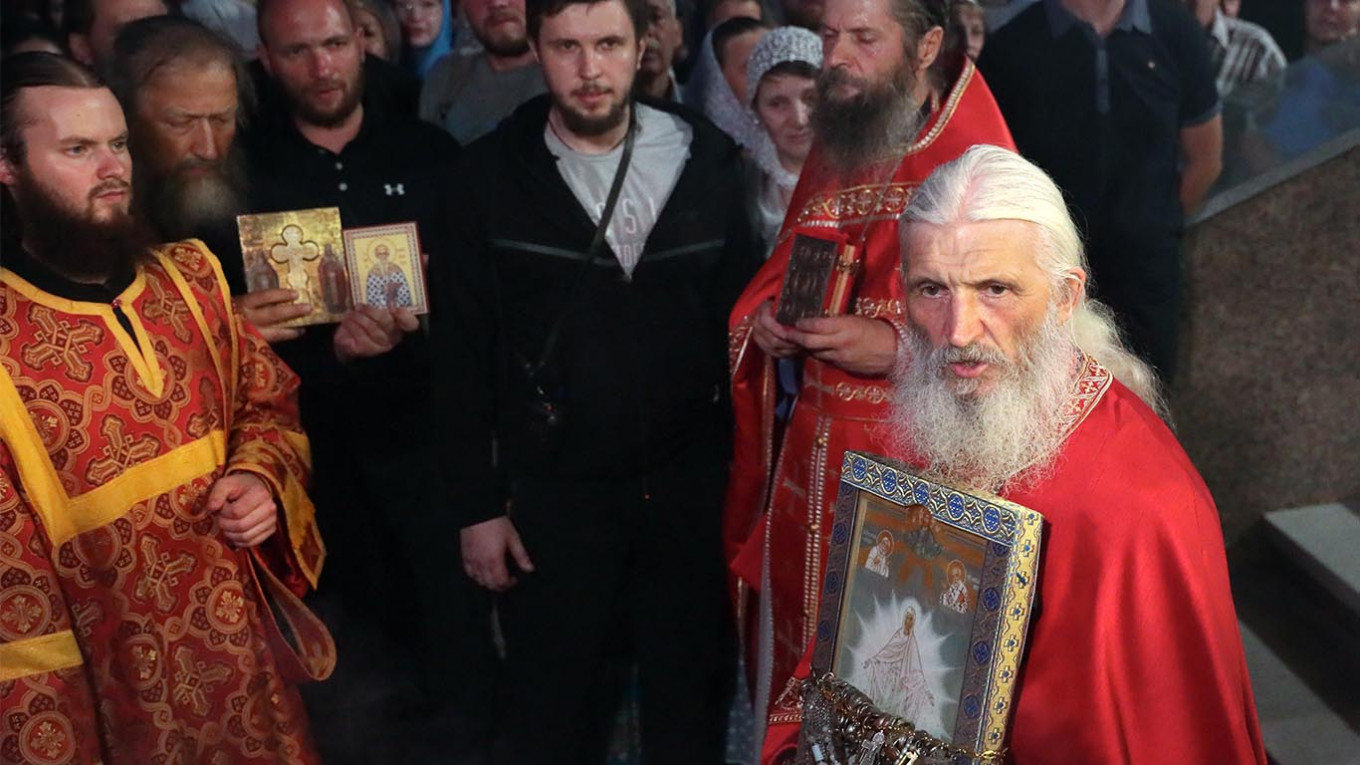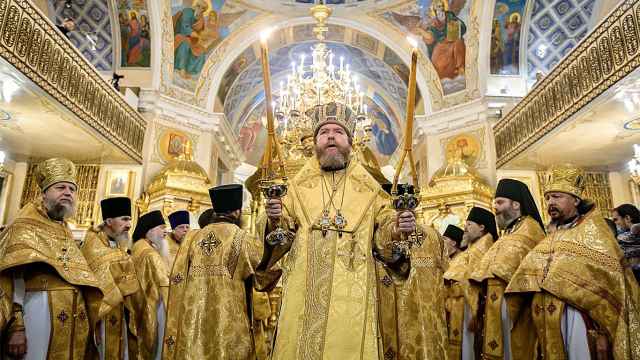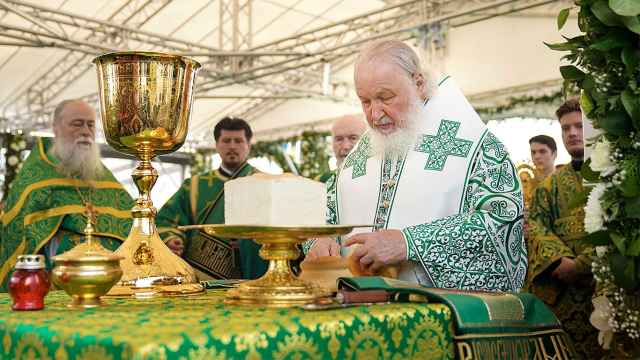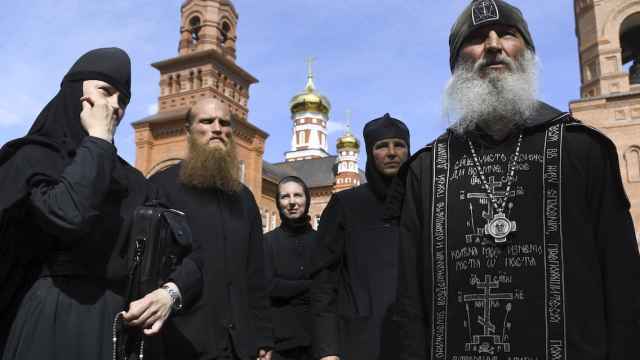In a forest outside Yekaterinburg, pilgrims chant and wave banners in their annual midnight procession in honor of Nicholas II, the last Tsar of Russia and a saint in the Russian Orthdox Church.
But this year’s pilgrimage to the spot where the emperor and his family were executed by the Bolsheviks on July 16, 1918, was unlike any that have gone before. Local Church officials led one group, while others followed Father Sergei Romanov, a rogue cleric whose denial of the coronavirus and seizure of a monastery this summer have cost him his priesthood.
"I am ready to give my life for each of you,” Father Sergei told his followers. “Are you sure that those who run the country would do the same?”
With his long, snow-white hair and beard, flowing black robes and piercing glare, Father Sergei cuts a striking, intimidating figure.
A prominent but controversial figure within the Church, observers say his charisma and plain speaking draw people to him, making his radical, ultraconservative vision of Christianity and espousal of conspiracy theories palatable.
Church officials hope Father Sergei’s power and influence are fading in the wake of his challenges to the authority of the Church and President Vladimir Putin. While the renegade priest is now defrocked, disgraced and losing allies, he says he has no intention of stepping down and surrendering the monastery.
‘Satanic plot’
The coronavirus pandemic divided the Church this spring, when its leaders imposed safety rules within cathedrals and encouraged its clergy to move services online — but not everyone followed suit.
The debate over the coronavirus and its severity has set off “a process of decentralization” within the Church, with its most conservative circles eschewing the public-health measures, according to Ksenia Luchenko, a journalist who specializes in church affairs.
“Refusal to obey government rules on the closure of churches is seen by some as a new form of martyrdom,” she wrote in a commentary for Carnegie.
In the Sverdlovsk region, which now has the country’s second-highest rate of new coronavirus cases, Father Sergei has been one of the loudest voices of dissent, calling coronavirus restrictions a “satanic plot” and blasting those who seek to close cathedrals.
“By closing churches,” he said in April in a now-deleted video, “our spiritual leadership is working with the forerunners of the Antichrist, covering up their shallowness and cowardice with an offer to communicate with God online.”
Russian officials accused him of disseminating hate speech with the video, and the Yekaterinburg diocese banned him from public ministry soon after.
Siege at Sredneuralsk
After being banned from preaching, Father Sergei set his sights on the Sredneuralsk women’s monastery, which he founded in 2005.
In June he gathered his supporters along with an armed force of Cossacks and Donbass war veterans and surrounded the monastery, forcing out its head abbess, Mother Superior Varvara, and barring representatives from the Yekaterinburg diocese from entering.
The monastery is now home to 530 men, women and children who follow Father Sergei’s spiritual leadership, according to his spokesperson Vsevolod Moguchev. Local media reports have said figures like actor Dmitry Sokolov and hockey star Pavel Datsyuk are among them. Other worshippers and pilgrims come from all over Russia to hear his sermons, in which he outlines his visions of an impending holy war preceding the end of the world.
Under Father Sergei the monastery operates under a shroud of secrecy, barring journalists from entering and treating would-be observers with hostility.
He posts regular addresses on YouTube, detailing conspiracy theories such as his belief that the coronavirus was manufactured to implant “surveillance chips” into the population. Exorcisms take place in the monastery every day at 6:00 a.m. while he resides there, a reporter for The Independent wrote in a 2017 eyewitness account. A report from BBC Russia detailed alleged physical and psychological abuse of children within the monastery, allegations now being investigated by federal authorities.
“The monastery operates as it did before — it serves God and cares for children, helps cancer patients, provides food for the poor,” Moguchev, an Orthodox blogger who started working for Father Sergei to “tell people the truth that is being hidden by many media outlets and by Church authorities,” told The Moscow Times. “No laws are being violated.”
The Yekaterinburg diocese disagrees.
“[Father Sergei] continues to perform divine services which are illegal and graceless, and is trying to manage the convent instead of its lawful abbess Varvara,” said Yekaterinburg diocese spokesperson Anzhela Tambova. “This is a testament to his profound spiritual ill-being and is increasingly alienating him from the Russian Orthodox Church.”
This month, an ecclesiastical court ruled to defrock Father Sergei over his refusal to follow coronavirus restrictions, a decision confirmed by Patriarch Kirill last Friday.
“When he started to broadcast his nonsense to millions, [the Church’s] patience ran out,” religious scholar Roman Silantiyev told The Moscow Times.
The disgraced priest and his followers have likened the ecclesiastical court’s ruling to a show trial and continue to occupy the monastery.
From prison to the parish
In his former life, the man who changed his secular name to Nikolai Romanov in honor of Russia’s last ruling dynasty, was a police officer in Moscow suburb.
While serving a 13-year prison term for murder and armed robbery, to which he pleaded guilty, he started developing a reputation as an Orthodox activist. After he was released from prison in 1997, the Church allowed him to become a priest, despite his criminal record. The details of how he rose through the ranks are unclear.
Over the years, he carved out a sphere of notoriety within the Church. The face of the cult-like tsarebozhniki, or “tsar worshippers,” movement that views Nicholas II as a co-redeemer of the Russian people alongside Jesus Christ, he has drawn controversy for performing exorcisms on children, praising Soviet leader Josef Stalin and espousing Judeo-masonic conspiracy theories.
Photos of Father Sergei’s residence in the Sredneuralsk monastery show walls lined with icons of Nicholas II and portraits of Stalin. He uses a coffin as his desk, calling it a “reminder of death.”
Andrei Pertsev, a special correspondent for the Meduza news website who has reported from the Sredneuralsk monastery, said Father Sergei’s “self-confidence and radicalism” draw people to him.
“People think his radicalism is proof that he stands for the truth,” he said. “Men are attracted by his intransigence and brutality; Women are the same.”
Once people are drawn in, commentators say the renegade priest uses psychological manipulation to make them stay.
“This is a typical swindler,” Silantiyev said. “Using various manipulations, these types of people force people to trust and believe them completely. They start to control people’s lives and gain authority over them.”
The Independent report said he has powerful backers that enabled him for years to lead his followers with free rein. He was widely reported in Russian media to be the confessor of prominent political and cultural figures including Russian lawmaker and former Crimean prosecutor Natalya Poklonskaya, though this was never confirmed.
Since his coronavirus denial this spring, his support appears to be shrinking, however, with Poklonskaya distancing herself from the priest and the monastery’s residents starting to leave for good. Forty people have left the monastery so far and an unknown number of pilgrims and worshippers have departed from the surrounding monastic communities, said Tambova.
‘Spiritual war’
Father Sergei has continued to challenge the Church’s authority since the siege at Sredneuralsk. He has called on Patriarch Kirill to resign and said that Metropolitan Kirill, the head of the Yekaterinburg diocese, will have to take the monastery back by force.
“How could the Yekaterinburg diocese technically expel Father Sergei from it? They have no separate, legitimate army that could capture monasteries or settlements,” Moguchev said. “They have been trying for a long time to make various provocations that could eventually involve law enforcement agencies. ... So far, thank God, they have had no luck with that.”
In addition to challenging the Church, Father Sergei has in recent weeks called on Putin himself to step down and transfer power to him instead.
“Otherwise, I’ll declare a full-scale spiritual war against you personally,” he said in a video published on Moguchev’s YouTube channel.
Despite Father Sergei’s increasingly provocative statements, the Church is taking a hands-off approach, hoping that with time his base of supporters will shrink and allow the Church to retake the monastery peacefully.
“The Yekaterinburg diocese has no doubts that the Sredneuralsk monastery will be returned to the bosom of Mother Superior Varvara,” Tambova said. “The Lord will put everything in its place, as has happened repeatedly in the history of the Russian Orthodox Church.”
Daniil Galaydov and Sonia Kopelev contributed reporting.
A Message from The Moscow Times:
Dear readers,
We are facing unprecedented challenges. Russia's Prosecutor General's Office has designated The Moscow Times as an "undesirable" organization, criminalizing our work and putting our staff at risk of prosecution. This follows our earlier unjust labeling as a "foreign agent."
These actions are direct attempts to silence independent journalism in Russia. The authorities claim our work "discredits the decisions of the Russian leadership." We see things differently: we strive to provide accurate, unbiased reporting on Russia.
We, the journalists of The Moscow Times, refuse to be silenced. But to continue our work, we need your help.
Your support, no matter how small, makes a world of difference. If you can, please support us monthly starting from just $2. It's quick to set up, and every contribution makes a significant impact.
By supporting The Moscow Times, you're defending open, independent journalism in the face of repression. Thank you for standing with us.
Remind me later.







